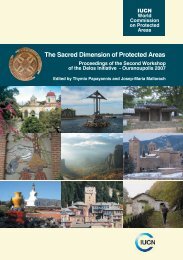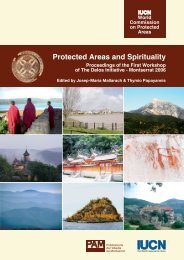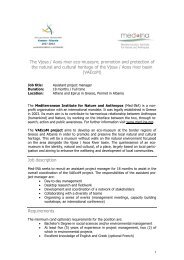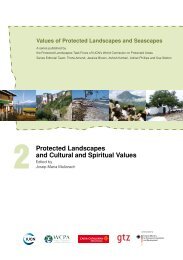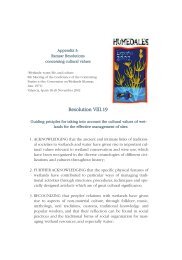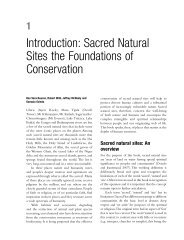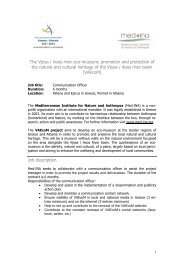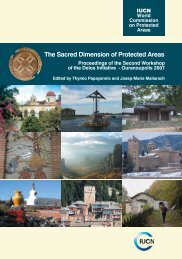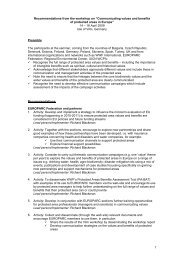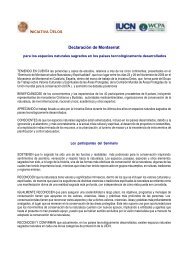The Diversity of Sacred Lands in Europe - IUCN
The Diversity of Sacred Lands in Europe - IUCN
The Diversity of Sacred Lands in Europe - IUCN
You also want an ePaper? Increase the reach of your titles
YUMPU automatically turns print PDFs into web optimized ePapers that Google loves.
lated to nature conservation. After all,<br />
such practices are part <strong>of</strong> their history,<br />
and most communities have kept records<br />
<strong>of</strong> this; and many monastic communities<br />
are produc<strong>in</strong>g very f<strong>in</strong>e organic<br />
products, such as cheese, beer,<br />
w<strong>in</strong>e, liqueur, herbal remedies, <strong>in</strong>cense,<br />
etc., or outstand<strong>in</strong>g quality<br />
crafts, like icons, rosaries, or pottery.<br />
Others are still engaged <strong>in</strong> farm<strong>in</strong>g,<br />
animal husbandry, fish<strong>in</strong>g or forestry.<br />
All <strong>of</strong> these activities, naturally, presuppose<br />
a spiritual and ecologically responsible<br />
approach to the relationship<br />
between man and nature, which is, as<br />
we have seen, at the very heart <strong>of</strong> the<br />
monastic life.<br />
Values and pr<strong>in</strong>ciples<br />
Christian monastic communities have<br />
been established for more than ten<br />
centuries <strong>in</strong> most <strong>of</strong> <strong>Europe</strong> and the<br />
Middle East. <strong>The</strong>y are, without question,<br />
the oldest democratic and self-organised<br />
communities <strong>of</strong> this part <strong>of</strong> the<br />
world to have a cont<strong>in</strong>uous positive impact<br />
on nature conservation. This significant,<br />
but <strong>of</strong>ten overlooked, historical<br />
fact can be expla<strong>in</strong>ed, <strong>in</strong> part, because<br />
monastic communities are<br />
based on pr<strong>in</strong>ciples which are deeply<br />
coherent with environmental susta<strong>in</strong>ability,<br />
such as:<br />
• Stability, discipl<strong>in</strong>e, asceticism, sobriety,<br />
‘poverty’<br />
• Reduc<strong>in</strong>g material needs; <strong>in</strong>creas<strong>in</strong>g<br />
time for prayer, contemplation and<br />
meditation<br />
• Orientation not to material pr<strong>of</strong>it, but<br />
to spiritual benefit<br />
• <strong>The</strong> idea <strong>of</strong> communal rather than<br />
private property; the concept <strong>of</strong><br />
monks as custodians or stewards,<br />
never owners<br />
• Cherished values which <strong>in</strong>clude: sacredness,<br />
silence, solitude, harmony,<br />
beauty<br />
• Aim<strong>in</strong>g for perfection, or excellence,<br />
<strong>in</strong> the spiritual and material doma<strong>in</strong>s<br />
• Creation/Nature as an image/manifestation<br />
<strong>of</strong> God/Div<strong>in</strong>ity/the <strong>Sacred</strong>,<br />
or as a Teacher. Creation as a gift to<br />
be safeguarded and bestowed on future<br />
generations<br />
• All natural liv<strong>in</strong>g be<strong>in</strong>gs liv<strong>in</strong>g <strong>in</strong> permanent<br />
praise <strong>of</strong> their Creator<br />
<strong>The</strong> values that monastic communities<br />
embrace are, therefore, very removed<br />
from the ma<strong>in</strong>stream values <strong>of</strong> Western<br />
materialistic societies, and <strong>in</strong>deed <strong>in</strong><br />
this sense the monks may be said to<br />
share common ground with most traditional<br />
communities or <strong>in</strong>digenous peoples<br />
<strong>of</strong> the world.<br />
Some have criticised the <strong>in</strong>habitants <strong>of</strong><br />
monastic communities for ‘abandon<strong>in</strong>g<br />
the world’, which is <strong>of</strong> course partially<br />
true, but what is even more true is the<br />
fact that seclud<strong>in</strong>g themselves from<br />
society, these men and women strive<br />
to live <strong>in</strong> spiritual communion not only<br />
with other human be<strong>in</strong>gs, but with the<br />
entire existence. Accord<strong>in</strong>g to the authorities<br />
<strong>of</strong> the Mar Mousa monastery,<br />
Syria, ‘the second priority is Evangelical<br />
simplicity, a way for liv<strong>in</strong>g <strong>in</strong> harmony<br />
and complete responsibility with the<br />
Creation and the society that surround<br />
us (...) with an aesthetic <strong>of</strong> justice and<br />
gratification’ (excerpt from the <strong>of</strong>ficial<br />
web site).<br />
164



